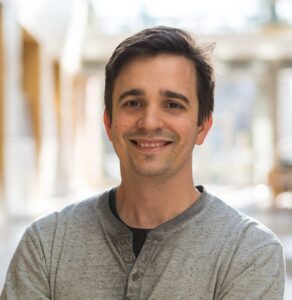Blusson QMI Investigator Joseph Salfi has started building a new $1.6m research facility that will be used to study new methods for building, controlling and networking quantum computers. The project has received $560,000 through the Canada Foundation for Innovation’s (CFI) John R. Evans Leaders Fund (JELF).
The new infrastructure brings key capabilities to Salfi’s research activities within Canada’s National Quantum Strategy, which are being carried out with industry partners such as 1QBit, D-Wave, Keysight Canada and Syniad Innovations as well as academic partners in Canada, including Université de Sherbrooke.

Image: Joseph Salfi, Investigator, Blusson QMI.
“A critical barrier to quantum computing is the problem of decoherence or the accumulation of errors in qubits. We will investigate methods to overcome errors in near-term algorithms that exploit the characteristics of semiconductor-based quantum hardware,” said Salfi.
“Another challenge is the difficulty in scaling quantum computers up to the level required to implement fault-tolerant quantum computing, which is the only known strategy to completely circumvent errors due to decoherence. We will investigate enabling technologies that could accelerate that pathway to fault-tolerant quantum computing.
“The new research infrastructure will allow us to work towards resolving these issues to unlock the potential of quantum computers to solve real-world problems that are impossible on classical computers.”
Quantum computers derive their computational power from fundamental changes in how information is encoded and processed in quantum superposition states, using ‘qubits’ (short for quantum bit) as the basic unit of information. Unlike classical bits (that can only represent a single binary value such as 0 or 1), qubits exist in a superposition of states, meaning they can be both 0 and 1 simultaneously (or any combination of these states).
“Quantum computers promise transformative computational capabilities. Once operationalized, they are anticipated to solve problems that are out of reach for any classical computer in areas like simulating materials, chemical catalysts and drug discovery,” Salfi said.
“However, the technology is still very much in the embryonic stage. In the realm of useful calculations, quantum computers are currently limited to solving problems easily solved by their classical counterparts.”
The CFI invests in research infrastructure at Canadian universities, colleges, research hospitals and non-profit research institutions, equipping researchers with the tools they need to be global leaders. Its JELF program helps institutions attract and retain researchers and provides support for the Canada Research Chairs Program.
#ENDS#
Media contact: Shahrzad (Zad) Abbasi | 604 360 6761 | shahrzad.abbasi@ubc.ca


